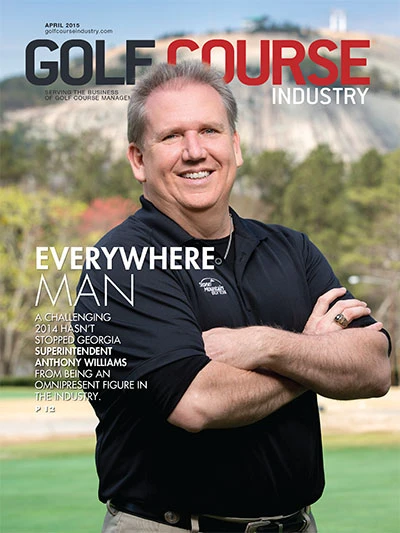Drag Board
 This implement does a fine job of raking the native area shell screenings two times per week at the Emerald Dunes Club in West Palm Beach, Fla. Four 2-inch by 6-inch by 4-foot pressure treated wood boards, attached in a staircase concept, are overlapped 2 inches and then attached together with 3-inch wood screws. The upper and lower bottom-leading edges are protected with recycled Toro 5410 Fairway Mower bedknives that are screwed in place. Fourteen 3-inch by 5⁄16-inch hex nuts are screwed into the boards that loosen up the screenings prior to being finish-raked with the three overlapped Truper 24-inch Spring-Loaded Metal Leaf Rakes. There are two recycled John Deere Aerocore 800 Aerator Arm Drive Belts attached on top that are used by the maintenance staff as handles to lift the drag board into the Club Car tow vehicle. A 5-foot chain is used to pull the drag brush. It cost approximately $75 in materials and it initially took two hours to build, which has been reduced down to one hour, and each board lasts about three months. Dan Green, former superintendent under Erin Stevens, CGCS, director of golf course maintenance, conceived and did the original design that has been tweaked over the years by the staff. This latest version was built by equipment manager Menard Saul.
This implement does a fine job of raking the native area shell screenings two times per week at the Emerald Dunes Club in West Palm Beach, Fla. Four 2-inch by 6-inch by 4-foot pressure treated wood boards, attached in a staircase concept, are overlapped 2 inches and then attached together with 3-inch wood screws. The upper and lower bottom-leading edges are protected with recycled Toro 5410 Fairway Mower bedknives that are screwed in place. Fourteen 3-inch by 5⁄16-inch hex nuts are screwed into the boards that loosen up the screenings prior to being finish-raked with the three overlapped Truper 24-inch Spring-Loaded Metal Leaf Rakes. There are two recycled John Deere Aerocore 800 Aerator Arm Drive Belts attached on top that are used by the maintenance staff as handles to lift the drag board into the Club Car tow vehicle. A 5-foot chain is used to pull the drag brush. It cost approximately $75 in materials and it initially took two hours to build, which has been reduced down to one hour, and each board lasts about three months. Dan Green, former superintendent under Erin Stevens, CGCS, director of golf course maintenance, conceived and did the original design that has been tweaked over the years by the staff. This latest version was built by equipment manager Menard Saul.
Replacement Fenders
 The original plastic fenders on this 2000 Buffalo Turbine Trailer-Mounted Blower were replaced after they became brittle from sunlight after many years of service — and they eventually cracked, as shown in the foreground, from the trailer being accidentally jackknifed. The replacement fenders were made using two recycled Cushman Core Harvester Side-Shoot Conveyor Belts. The OEM fender support brackets were used while adding pieces of 1-inch angle iron that was bolted to the conveyor belts in the front and rear. Steve Mathre, equipment manager, and David Phipps, former superintendent, at the Stone Creek Golf Club in Oregon City, Ore., conceived and built this unique idea. All of the new and recycled parts were in inventory and it took about 1½ hours labor time. Phipps is now the GCSAA field staff Northwest Regional representative. Mike Turley is the golf course superintendent.
The original plastic fenders on this 2000 Buffalo Turbine Trailer-Mounted Blower were replaced after they became brittle from sunlight after many years of service — and they eventually cracked, as shown in the foreground, from the trailer being accidentally jackknifed. The replacement fenders were made using two recycled Cushman Core Harvester Side-Shoot Conveyor Belts. The OEM fender support brackets were used while adding pieces of 1-inch angle iron that was bolted to the conveyor belts in the front and rear. Steve Mathre, equipment manager, and David Phipps, former superintendent, at the Stone Creek Golf Club in Oregon City, Ore., conceived and built this unique idea. All of the new and recycled parts were in inventory and it took about 1½ hours labor time. Phipps is now the GCSAA field staff Northwest Regional representative. Mike Turley is the golf course superintendent.
Get curated news on YOUR industry.
Enter your email to receive our newsletters.
Explore the April 2015 Issue
Check out more from this issue and find your next story to read.
Latest from Golf Course Industry
- USGA releases Water Conservation Playbook
- Vilamoura Golf courses awarded GEO Certified status
- GCSAA’s Health in Action 5K/2K reaches fundraising goal
- Landscapes Golf Management to participate in data analyzation initiative
- Reel Turf Techs: Carl Michael
- Atlanta Athletic Club approves funding for master plan
- Maximizing Cultural Practices and Agronomic Benefits with Minimal Surface Disruption
- Real Answers about Spray Nozzle Choices






